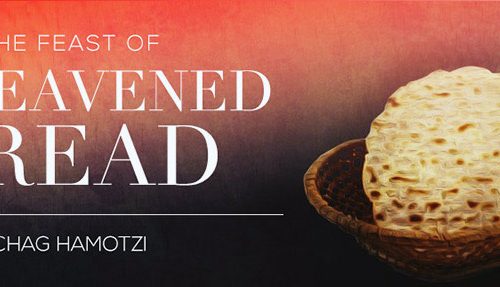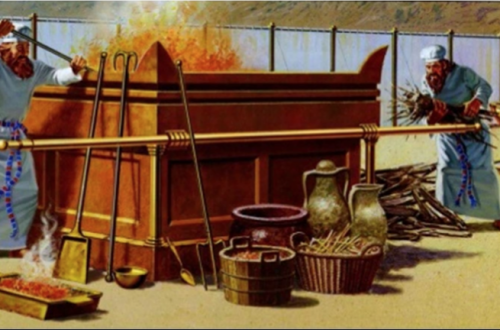The faithfulness of God
Romans 9:1–5 is part of the lectionary readings for the ninth Sunday after Pentecost, which is August 2nd. In chapters 1 through 3, Paul spoke about the responsibilities of Jews and Gentiles in light of the knowledge God had provided for each of them.
Then, in chapters 9 through 11, the apostle advanced the preceding discussion by describing the roles each group would play in God’s plan of salvation. On the one hand, the Israelites had gloried in the fact that they were God’s chosen people (Deut. 7:6; 14:2; 1 Kings 3:8). Yet, on the other hand, they had largely forsaken the Creator, and subsequently He gave believing Gentiles a significant role in His redemptive plan (Eph. 2:11–13; 1 Pet. 2:9–10).
Did the above truths mean that the Lord had abandoned the Jews in favor of the Gentiles? Paul addressed this important question in Romans 9 by describing God’s unwavering commitment to His covenant promises involving the Jews.
The apostle began by affirming that his heart was filled with deep, continual grief over Israel’s rejection of the Messiah (10:1). Paul also declared that in addition to his conscience, the Son and the Spirit confirmed the truthfulness of the apostle’s intense sorrow (9:1–2). Perhaps Paul brought up the issue of his conscience because some of his religious peers asserted that, after he became a Christian, he became indifferent to the plight of his fellow Jews.
The apostle wanted to remove any doubt concerning the depth of his love for his ethnic Jewish peers (v. 3). This remained true, even though Paul often experienced firsthand obdurate resistance. For instance, whenever the apostle went on a missionary journey, he consistently went first to the Jewish synagogues to preach the gospel, and some unbelieving Jews repeatedly opposed him (Acts 18:6).
Paul’s distress over Israel was so great that, in a manner reminiscent of Moses (Exod 32:30–32), the apostle literally said he could wish himself “accursed” (Rom. 9:3) from the Savior. Put differently, the apostle would have been willing to suffer eternal separation from the Redeemer if it resulted in Israel turning to Him in faith for salvation. This sentiment reflected the genuine desire of Paul’s heart for his own ethnic group to be redeemed.
In verses 4 and 5, the apostle listed a number of privileges that belonged to Israel as God’s chosen nation. For example, Paul stated that God had adopted the Israelites as His children. Though this concept is not used of the nation in the Old Testament, it is definitely present (Exod 4:22; Deut 32:6; Isa 63:16; 64:8; Jer 31:9; Hos 11:1; Mal 2:10).
The Israelites also witnessed God’s “glory” (Rom 9:4) in the wilderness tabernacle and Jerusalem temple. His majestic splendor was evidence of His sacred presence among His people (Exod 16:7, 10; 29:43; 40:34; 1 Kings 8:11; Ps 63:2; Ezek 43:4).
Another privilege was that the Israelites were the recipients of God’s “covenants” (Rom 9:4). These included those God made with Abraham (Gen 15:9–21; 17), Moses (Exod 19–24), and David (2 Sam 7:5–16; Eph 2:12).
Furthermore, the Israelites were the beneficiaries of God’s “law” (Rom 9:4) revealed on Mount Sinai (Exod 19–20; Deut 5). In fact, many Jews who lived during Paul’s day revered the Mosaic Law (Rom 2:17).
In addition, God’s chosen people valued the rituals their priests performed within the temple (especially involving the sacrificial system). This was a great privilege, since the Creator manifested His presence in the sanctuary.
Moreover, the Jews were heirs of God’s redemptive “promises” (9:4), especially those made to Abraham, their esteemed ancestor (Gen 12:1–2; 15:4–6, 18–21). Paul also noted Israel’s intimate connection with the “patriarchs” (Rom 9:5), Abraham, Isaac, and Jacob. Through them, God pledged to not only bless Israel, but also the entire world (Gen 18:18; 22:17–18; 26:3–4; 28:13–14; 35:11–12).
All the preceding privileges specifically applied to God’s chosen people. Paul, as a Jew, was acutely aware of the role each of these blessings played throughout history in Israel’s relationship with the Creator.
Most importantly, from the Jews was traced the physical lineage of the Messiah, whom Paul described as “God over all” (Rom 9:5). This verse is one of the apostle’s strongest affirmations of the Messiah’s deity (Phil 2:6; Col 1:15, 19; 2:9; Titus 2:13).
Ethnic Israel could not boast about its affiliation with the Savior in the same way that it could draw attention to its relationship with the patriarchs. The nation’s connection to the patriarchs was one involving physical descent, whereas a genuine baptismal union with the Redeemer was a spiritual matter.
The preceding truth was pivotal in discerning the ongoing relationship of the chosen people with God. The fact that in Paul’s day many of them had rejected the Son did not mean that the Father had “failed” (Rom 9:6) to fulfill His covenant promises or somehow stumbled in bringing about His plan for the salvation of Israel (11:25–29).
After all, the apostle explained, the true “Israel of God” (Gal 6:16) was not synonymous with the biological descendants of Jacob. Those who, like Abraham, had genuine faith in the Creator, comprised the righteous remnant (Rom 4:11–12). Also, a person was an authentic Jew only if he or she was one inwardly, that is, one whose heart the Spirit had circumcised (2:28–29).
Even during the Old Testament era, there were always unbelievers and believers within Israel. To illustrate this point, Paul offered three specific examples: Isaac and Ishmael (9:7–9), Jacob and Esau (vv. 10–13), and Pharaoh (vv. 14–18).
In the first illustration, Paul cited Genesis 21:12 to emphasize that the line of promise would come through Isaac (Rom 9:7). Ishmael had been born to Abraham’s concubine, Hagar (Gen 16). In addition, the six sons of Keturah were among Abraham’s descendants (25:1–4). Nonetheless, in terms of the divine promise, these individuals were not counted as Abraham’s rightful heirs.
Despite the prevailing view that Israel’s physical descendants would automatically inherit eternal life (Matt 3:9; John 8:39), Paul literally said it was not the “children of the flesh” (Rom 9:8) who were necessarily God’s heirs. Instead, it was the “children of the promise” who were regarded as Abraham’s descendants.
In short, the members of the covenant community involved God’s sovereign choice. For instance, looking back to Genesis 18:10 and 14, Paul cited the Lord’s words to Abraham that within a year, Sarah, Abraham’s wife, would give birth to a son (Rom 9:9). In turn, Isaac would be the one through whom the line of promise would come.
Paul moved on to his next illustration, based on the second generation of Jewish ancestry, namely, Jacob and Esau, the twin sons of Isaac and Rebekah (v. 10). In this historical episode, God made His choice regarding the promised line even before the twins were born and had done anything characterized by virtue or vice (v. 11).
One view held by many evangelicals is that God looked into the future, saw Jacob’s eventual willingness to obey, and chose him on that basis. A second view held by confessional Lutherans is that God’s choice of Jacob over Esau was not due to the deeds either offspring performed throughout their lifetimes.
Instead, God simply made an autonomous decision in accordance with His redemptive “purpose.” His choice involved not only the promised line, but also that the descendants of Esau (the Edomites) would serve the descendants of Jacob (the Israelites; v. 12; see Gen 25:23; 2 Sam 8:14; 1 Kings 22:47).
In Romans 9:13, Paul quoted Malachi 1:2–3, which reveals that God “loved” Jacob, but “hated” Esau (who despised the covenant promise). This was a Hebraic way of expressing greater and lesser love. The passage refers specifically to the nations arising from these two individuals.
In ancient times, the word “hate” was often used figuratively to refer to preference. So, in the current context, with respect to the promised line, “hate” carries the meaning, “Jacob I chose, but Esau I rejected.”
Furthermore, Paul was not depicting God as being a capricious and loathing deity. The Creator’s disposition was not petulant, but influenced by His covenantal promises.
The fact that God did not emotionally “hate” Esau is clear from the fact that the Lord bestowed many temporal blessings on Esau, his family, and his descendants. Against the backdrop of God’s covenantal promises, one could say that the word “hated” here carries the meaning “loved less” (Gen 29:31, 33; Deut 21:15).
“Hatred,” in the sense of “loving less,” was illustrated by what Jesus said in Matthew 10:37 and Luke 14:26. Jesus was not using the word “hate” in an absolute sense, but in connection with a more profound, eternal choice.
Even today, while we are to be devoted to members of our family, our love for them must never surpass our love for God. He alone is to be our foremost priority (John 12:25).
Paul knew that his detractors, after encountering his words about God’s sovereignty, might accuse him of teaching that the Lord was guilty of injustice (Rom 9:14). Expressed differently, wasn’t it unfair for the Creator to arbitrarily select Isaac over Ishmael? In response, Paul emphatically denied such a warped assertion (Gen 18:25; Deut 32:4; 2 Chron 19:7; Ezra 9:15; Neh 9:33; Ps 119:37; Dan 4:37; 9:14).
Next, in Romans 9:15, the apostle explained why by quoting from Exodus 33:19. In that passage, Moses learned it was God’s sole prerogative to show “mercy” and “be gracious” on whomever He chose.
The context of the verse was Israel’s idolatrous worship of the golden calf at Mount Sinai. If God had acted solely according to His justice, He could have eradicated the Israelites for their sin. Instead, He summoned Moses to return to Mount Sinai, where he once again received the Ten Commandments.
In Romans 9:14–15, Paul argued that God had the supreme authority to do as He pleased with His creation. This included being compassionate to whomever He desired. Because of the depth of human rebellion, the Lord was not obligated to show undeserved kindness to anyone.
Continuing the above line of reasoning, Paul said that God’s actions (such as the bestowal of mercy) did not depend on anyone’s intentions or endeavors. The Creator’s decisions rested only on His sovereign choice (v. 16). Oppositely, it is incorrect to extrapolate that God foreordained those who remained unsaved to experience eternal damnation (technically called the doctrine of double predestination).
In Paul’s third illustration, he moved from Moses (the leader of the Israelites) to Pharaoh (the leader of the Egyptians). Specifically, verse 17 contains a quote from Exodus 9:16. It reveals that God brought Pharaoh onto the stage of human history for the “purpose” of displaying the Creator’s saving “power” and declaring His holy “name” (or character) throughout the world.
The Egyptians believed in many deities. Even Pharaoh was considered a god. Yet, through the 10 plagues, the Lord demonstrated His absolute power over all the idols of Egypt, including the country’s ruler. When all the other nations heard about this, they were in awe of the God of Israel (Exod 15:14–16; Josh 2:9–11; 9:9).
Once more, in Romans 9:18, Paul deduced that God was merciful to whomever He chose. Likewise, it was His uncontested right to increase the callousness of those who refused to heed His will. This does not mean, however, that the Creator predestined such unbelievers to hell.
Most likely, Pharaoh hardened his own heart several times before God hardened it (Exod 7:13–14, 22; 8:15, 19, 32; 9:12, 35; 10:27; 11:10). The implication is that God sovereignly confirmed what was already taking place in Pharaoh’s heart. Egypt’s ruler was still responsible for his actions, even though God reinforced Pharaoh’s obstinate moral state in order to deliver Israel.
Paul again anticipated a question that might surface among his detractors. If God increased the stubborn disposition of people’s hearts, how could He justifiably hold them responsible for their iniquities? Supposedly, if God’s will was irresistible, then any accusation of wrongdoing appeared to be misplaced (Rom 9:19).
Paul responded by rebuking the arrogant attitude motivating such insinuations (v. 20). The apostle did not condemn honest inquiry. Rather, he reprimanded those who sought to escape personal responsibility by insisting that the Creator was the origin and cause of their sin. This type of blame-shifting was common among people who refused to acknowledge their trespasses.
Paul illustrated his point by drawing an analogy between God and a potter (v. 21). The apostle, citing Isaiah 29:16 and 45:9, argued that the potter had the right to make out of one lump of clay some pottery for honorable purposes and some for ordinary use (Jer 18:6).
Then, in Romans 9:22–23, Paul spoke about God’s intentions for two different peoples—the “objects of his wrath” and the “objects of his mercy.” The recipients of God’s anger were the unsaved (1:18). These individuals would suffer eternal judgment. Yet, despite their sin and horrible destiny, God had patiently endured their antagonism toward Him (3:25).
The Creator could have immediately annihilated evildoers from the earth. Yet, He did not do so because, as is clear from 2:3–4, the purpose of God’s patience and mercy was to bring about repentance.
God tolerated those who were wicked for the sake of those among them who would eventually be saved (1 Tim 2:4; 2 Pet 3:9). Nevertheless, a time was coming when God’s patience would end and judgment would come.
People who refused to repent were “storing up” (Rom 2:5) God’s wrath, which would one day inundate them like a flood. The Creator did not delight in pouring out His anger on the unrighteous. They suffered eternal punishment because of their consistent refusal to repent and accept responsibility for their transgressions.
The other group of people were the recipients of God’s “mercy” (9:23). He chose these individuals to reveal to the world His abundant “glory.” Indeed, He chose the redeemed in advance to share in His majestic splendor, beginning with them receiving His gift of salvation.
Paul declared that the objects of God’s grace included believing Jews and Gentiles (v. 24). To drive home this point, the apostle quoted from Hosea 2:23 and 1:10 (Rom 9:25–26). Under divine direction, Hosea gave his children symbolic names: Lo-Ammi, which means “not my people,” and Lo-Ruhamah, which means “not loved.”
In context, the preceding names pointed to God’s decision to permit sinful Israel to go into captivity and exile (1:2–9). Yet, the verses being quoted also pointed to God’s plan to restore the Israelites.
Paul applied Hosea 2:23 and 1:10 to the Gentiles (1 Pet. 2:10). Specifically, God took a group of individuals who were not His chosen people—the Gentiles—and brought them into a familial relationship with Him.
Whereas the Gentiles were not originally part of the righteous remnant, now by divine grace, they were called children of the “living God” (Rom. 9:26). If the Creator could set aside and restore Israel, then certainly He could also bring saved Gentiles into His protective fold.
Paul revealed that God’s sovereign calling always included a contingent of believing Jews. Even though the Israelites had consistently been rebellious, there were a few that remained faithful.
Since God preserved only a remnant in Old Testament times, this raised a critical issue for Paul’s Jewish peers who encountered the truths recorded in Romans. They had no reason to claim any inherent security from their heritage, for only the faith community would survive God’s judgment.
In verses 27–29, Paul substantiated his point by quoting from Isaiah 10:22–23 and 1:9. God had a loyal remnant during the captivity and exile, and He also had a believing contingent during Paul’s day (11:5).
Had a remnant not survived, Israel would have been obliterated like Sodom and Gomorrah. Yet, God’s covenantal love held His punishment in check. For this reason, Israel retained a significant role in the Creator’s sovereign plan of salvation.
Key ideas to contemplate
In Romans 9, Paul dealt with the issue of unbelief among his ethnic Jewish peers. The apostle countered the allegation that God had abandoned His chosen people. Paul argued that the Creator always remained faithful to His covenant promises.
1. Deep anguish. Paul was candid in admitting the deep anguish he felt over many of his Jewish peers rejecting the Messiah. So intense was the apostle’s distress that he could wish himself under God’s curse, if it might bring about the salvation of unregenerate Jews (vv. 1–3).
Consider how much you would like to see your unsaved relatives, coworkers, and neighbors come to faith in Christ. How might the Spirit use you to spread the gospel to the lost?
2. An amazing opportunity. Paul did not sidestep the issue that many within the Jewish community of his day remained unsaved. This continued to be true, even though God had blessed them with noteworthy spiritual privileges (vv. 4–5).
In fact, the Messiah could trace His human ancestry from God’s chosen people. Also, His advent was in fulfillment of the Creator’s messianic promises (v. 6). From these observations we see that all people, regardless of their gender, ethnicity, or socio-economic status, have an amazing opportunity to believe in Jesus for salvation.
3. Divine grace. Paul clarified that becoming a child of God did not depend on anyone’s noble intentions or laudable accomplishments. Instead, membership in God’s family was entirely the result of His grace (vv. 7–13). Here we recognize the importance of emphasizing God’s unmerited favor toward those who need to hear the good news about Jesus.
4. Divine mercy. Paul rejected the notion that God was unjust in how He unfolded His plan of redemption. As the apostle declared, God freely extended His mercy to whomever He desired. Indeed, the Creator wants all people to “be saved and come to the knowledge of the truth” (1 Tim 2:4).




